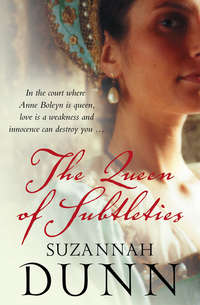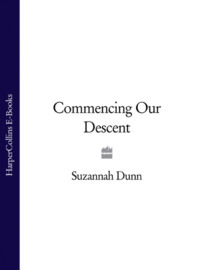
Полная версия
The Queen’s Sorrow
The man moved them swiftly to a staircase, shooing back the house dogs, up a flight and then along a rush-carpeted gallery – its walls papered, printed with a design in orange and turquoise – to more stairs, three flights of them. The room was small and simply whitewashed, with a glassed window but no fireplace, and the daylight was so weak that he couldn’t immediately ascertain its aspect. Their two chests had been delivered. On the bed were two piles of bedclothes, folded. A truckle bed was perfunctorily demonstrated: for Antonio, Rafael realised with a lurch of despair; he, too, was to be in here. There was no desk. When the truckle was out, there’d be no room for one.
The steward was confiding something, speaking quickly and quietly, his eyebrows raised; he indicated the doorway, the stairs, perhaps the house beyond. Rafael felt this was an explanation and an apology. The house was full and this was all there was. Rafael was careful to keep smiling and nodding; Antonio, he saw, was staring moodily at the window. The steward wore the same blue as the porter, but better cut and better kept, and beneath it was a shirt of good linen, perhaps even Holland linen. He’d stopped speaking and was instead presenting one hand to Rafael, palm upwards; the other hand prodded at it and then at his mouth. Forking food? Then a sweep of the hand that had held the imaginary food, from the doorway: Some food will be brought up to you, Rafael understood him to mean. More smiles and nods. No mention of dinner. They’d be having dinner daily at the household. Lunch at the palace, dinner at the Kitsons’, both at no cost: that was the arrangement, or so he’d been told. Could they have missed dinner? What time did these people eat? The steward was going, bowing out of the doorway, off to shower someone else with his abundant beneficence. They’d been dealt with.
Rafael sat on the bed – where else was there to go? – and felt he’d never get up again. Such a long, long day, it’d been; it seemed to have started days ago. And in a way, it had – thirteen days ago, when he’d left home. Two days to the port, five days sailing across the sea, three anchored, and then three travelling through England. And here he was, arrived; only just arrived, but ready now to go home. The journey was done – he’d done it, come to England – and now he wanted to go home. He had a home, and the very fact of it was compelling: home was where he should be. All he had to do was turn and go. Yet he felt adrift, and despaired of ever seeing it or Leonor and Francisco again.
Antonio said, ‘I’m going out for a drink.’ He spoke from the doorway; he hadn’t come in any further. He didn’t say, You coming? And of course Rafael didn’t. He could imagine that there might have been a temporary truce on this first evening at the end of their very long journey. A grudging truce. But no, and he was glad, really, and relieved. They’d been in each other’s company all day and – the horror of it – were going to be in each other’s company all night. He said, though, ‘You don’t speak English.’ Meaning, You’re Spanish. And Spanish – as they all knew – wasn’t a good thing to be, at present, in London.
No one expected problems from nobles and officials – they’d be well schooled in manners and they’d have jobs to do and be kept busy doing them – but the common people were known for their dislike of foreigners at the best of times, Rafael had heard, to say nothing of when their reigning monarch had just become a foreigner’s wife. Their ruler: now someone’s wife, and, worse, someone who wasn’t just anyone but heir to the world’s biggest empire. Who, in this marriage, was to obey whom? Should she obey her husband, or should he, mere prince in her country, obey her? But he was her husband, and how could a wife not obey? Well, with considerable ease, in Rafael’s experience and, he bet, in the experience of a lot of husbands with varying degrees of happiness and success. But the Church, in its unmarried wisdom, saw it as impossible. A wife obeys a husband: simple as that. And, anyway, one day soon, this husband – amenable though he was reputed to be – would be ruler of most of the world, which was another reason, so the thinking went, for his wife to get used to knuckling under. They’d been warned over and over again on the ship to anticipate the Englishman’s ambivalence and try to understand it. Play the grateful guest at all times and never rise to provocation because the English – Godless people stuck there on their island – are barbarians and we won’t sink to their level. And remember, above all, remember that it’s not for long. Six weeks and we’ll be gone, diplomatic mission done. Until then, keep your head down.
So, how was striding into a London tavern and speaking Spanish keeping your head down? But, of course, Antonio had an answer, as to all things, unintelligible though this one was to Rafael. It was English, he knew: probably, A jug of your best ale, please, sir. Too fast, though, for him to grasp. They’d all learned some English during the voyage – greetings, pleasantries, a few crucial nouns – from English-speaking seamen, and Rafael had worked longer and harder at it than most, but what Antonio had lacked in application, he was clearly making up for in confidence. And so now here he was, ready for drinks with the locals.
Well, good luck to him. Left alone, Rafael lay back on the unmade bed. This is so far from home, came to him. Leonor, this is so far from home. She wouldn’t want to hear that, though; she’d want to hear about the house. What could he tell her? I’m in a grand house in London. Blue-liveried staff. Dogs, though, indoors. In his mind, he walked himself back through the house, the way he’d come, this time taking note and trying to glance ahead. Everything new, by the look of it: freshly painted panelling, the frames red, the insets gold. Tapestries with a sheen to make you blink. There’s a clock just inside the main door, Leonor, and you’ll know that I’ll be going down there to take a closer look at that. She wouldn’t be interested in the clock; clocks were no interest of hers. He sat up, but laid his head in his hands. Francisco, Poppet, the doorknocker’s a leopard’s head. Yes! Snarling, keeping guard on the house. I’ll have to be brave, whenever I knock. And there are dogs, too, inside the house. I came here, to this house, on a river; it’s almost as wide as you can see, and it’s so busy, it’s like a town in itself. Not just boats, but swans, hundreds and hundreds of them. And along the river are huge red houses like castles. Do you remember, darling, your ‘purple house’?
No, he wouldn’t remember, and Rafael himself was surprised by the memory. Francisco hadn’t mentioned his ‘purple house’ for a long time, perhaps a year or more, but back when he was two or so, if he liked something, he’d say he’d have it for his ‘purple house’. I’ll have that in my purple house: a little stool; an ornate-handled knife; a neighbour’s donkey. No one but Francisco knew what or where this purple house was. Nonetheless, it was well furnished. Long forgotten, now, though. He’d moved on.
What would I have in my purple house? Rafael laughed to himself even as he was aware of being close to tears. These past thirteen days, he’d been shaken to the core by how homesick he felt: the savagery of it, its relentlessness. Dizzied by it, was how he felt. About to buckle. Hollowed, as if something had been ripped from him. His chest sang with the pain and he was confused and ashamed because he saw no sign that other men felt like this. Antonio certainly didn’t. But, then, other men too would hide it, wouldn’t they, so there’d be no knowing. He hadn’t anticipated feeling like this. He’d often been away from home – sometimes for a couple of weeks – and had never enjoyed it, but nothing had prepared him for this. And because he hadn’t anticipated it, he felt tripped up, tricked by it, taken unawares and thereby enslaved by it. He couldn’t see how he’d get from under it, or how he was going to cope, to continue, from day to day. Common sense told him that he would, that it would lessen, but he didn’t believe it. This homesickness was going to hunt him down.
He missed his little Francisco – God, how he missed him – and in six weeks there’d be so much more to miss, because he was growing so fast. A head taller at a time, he seemed. Rafael felt that his son’s head came up to his chest now, even though he knew it couldn’t be so – but that’s where he felt the lack of him, that’s where the hollowness was. That little head. Rafael longed to cup the back of it as he had when Francisco was a baby; take the weight of it, enjoy the fit and solidness of it in one hand. His little boy’s hair, too: his silly blond hair, as Rafael thought affectionately of it. He longed to touch it, to relish its abundance. Not much of it was there when he was newborn, most of it had grown since – which Rafael found almost comical, and touching: all that busy, vigorous but gloriously oblivious growing that Francisco had done for himself.
What if something happened to Francisco while he was away? This was what had got a hold on him, these last two weeks. This was what was haunting him: the fear that he’d never see his son again. That he’d already seen him for the last time. A fever, a fall. An act of negligence by a servant, or cruelty from a stranger. An abscess deep in an ear, the poison leaking deeper. A cat scratch going bad, a loose cart wheel, a rotten branch, a misfooting on the riverbank, a kick from a horse … Anything or nothing, really: it could be nothing that would do it, in the end. It happens.
He longed to ask Leonor, How do you live with this fear? In thirteen days, he seemed to have forgotten how to do it.
But Francisco was so full of life, he was crammed with it and, if he were with him now, he wouldn’t be sitting around like this. Snap out of it, Rafael urged himself. Stop this. For his sake. Because what kind of a father are you to him, to sit here like this, foretelling his death?
And it was at that moment that he saw the child. The door had been left ajar by Antonio and in the gap was a small face, a child, a boy of perhaps four or five years old. Huge blue eyes, serious expression. From behind him came a reprimand, ‘Nicholas!’ to which he reacted immediately, scarpering. The voice had been pitched to reach not only the child but also Rafael. And now, pitched even higher, for him alone, came a word he understood: ‘Sorry!’ The tone was cheerful, confident of acceptance, but no less heartfelt for it. He was across the tiny room in two steps. He couldn’t just stay sitting there in silence: he should accept the apology. And make clear that he hadn’t minded. On the contrary, any distraction was welcome, even a mute child.
Below on the stairs was a woman – a servant, judging from her simple linen dress and blue apron. She was poised to descend further, coifed head bowed and nape exposed. She was neither very young nor old. She was very pale. A plain, pale woman. Not plain in a bad way, though. Tall, long-boned and broad-browed: that’s what he noticed about her. That, and how she touched the child. Over one arm was looped some fine fabric – clothing, probably, for repair – and her free hand was on the little lad’s shoulder, ostensibly directing him down on to the step in front of her but, Rafael felt, less a shepherding than an excuse for contact. He recognised the quality of that touch. Parental.
She looked up, saw Rafael, gave a surprised, ‘Oh!’ and a smile. It spoke to him, that smile, he felt, although it said nothing much, said only pretty much what you’d expect: Kids, eh?! That affectation of resignation which was in fact senselessly proud. He did it all the time, he knew, back home, back in his life. He would’ve loved to have been able to say to her, Oh, I know, I know, my own little boy … and he felt she’d have welcomed it. An easy exchange, unremarkable, but such as he hadn’t had for weeks. The possibility of which, he realised, he’d begun to despair of. As it was, he returned the smile and said, ‘It’s fine, it’s fine,’ forgetting his English and speaking his own language. She understood him, though, he saw.

The next day, Rafael and Antonio had lunch at court – a whole separate sitting for Spaniards – before returning to their host, as arranged, for supper. Supper was served at five o’clock, they’d learned to their dismay. As such, it would follow their afternoon rest. They’d thought they’d stay at the palace for the afternoons – finding somewhere to bed down – but now they realised that, tide permitting, they might as well go back to the Kitson household after lunch and rest in the relative comfort of their room until supper. The problem concerned afterwards: no doubt everyone at the Kitsons’ would return to work after supper for a few hours, but for Rafael and Antonio there would be the journey all the way back to Whitehall. And, again, there was the tide to consider. The cost, too, although the fare was regulated and reasonable. Rafael had been told he’d be fully provided for, but of course he’d come with some money in hand. Whichever way they worked it, there would be, most days, a lot of waiting around, some unanticipated expenditure, and two long return journeys on the river.
Not for the time being, though. Apart from a couple of site visits, Rafael didn’t need to be anywhere in particular to do his work, although it would help to have space to lay out his drawings. In a couple of weeks’ time, though, Antonio would need a workshop in which to execute the design.
Tiredness always made Rafael hungry, and, after a night of trying and failing to sleep in the same room as Antonio, who snored, his tiredness was beyond anything that an afternoon rest could have improved. And, anyway, it hadn’t been much of a rest. The palace lunch had been so heavy that they’d been unable to face the river-journey immediately afterwards and instead they’d napped – or tried to – in the uncomfortably crowded room of friends that Antonio had made. Antonio had then suggested that they stay at the palace until the evening, skipping supper, making do with leftovers passed on from his new friends, but Rafael had insisted they both put in an appearance back at the house. He was going to have Antonio behave properly for once.
He regretted this stand of his, though, as they paused in the doorway of the Hall at five o’clock. Inside, there were tens of people already sitting packed together, while others hurried to step over benches and slot themselves down at the long tables. Clearly everyone knew his or her place. Even dogs, he saw to his horror: four, he spotted, nosing among the diners and receiving the occasional indulgent pat. Beyond all this, up on its dais at the far end of the room, was the elaborately set high table, as yet unoccupied by the householder and his family and their guests.
Where do we go? He sensed people staring, and no wonder: he and Antonio were conspicuous in their hesitancy. No overt hostility in the stares, he didn’t think, but nonetheless difficult to take. He couldn’t meet their eyes, there were too many of them; and even if he could have, then what? He had the distinct feeling that, if he smiled at them, they wouldn’t smile back. They didn’t want his smiles, they just wanted a good look at him: stranger, Spaniard.
And then he spotted the steward in the same instant the steward spotted him, but any relief was dashed when he saw from the man’s fleetingly startled expression that he’d forgotten all about them. Even this supremely organised steward had no idea where they should go and – worse – was about to make quite a show of rectifying the situation. And here it came, the big smile and a scanning of the tables before ‘Ah!’ – raised eyebrows, raised forefinger – as if he’d known all along that it was there, indeed had reserved it, and had only momentarily lost sight of it: a place for them.
As they made their way towards the bench, Rafael saw the servant-woman and her son in the glow from a west-facing window. She seemed at first to see him, but no: her gaze merely touched his face before moving onwards unchanged. She was whispering, he saw, to her son. No one in the room was talking, but she’d said something fast and low, a mere scrap of words. She mimicked inexpressiveness but there was tension in her face. No smile now. The little boy’s eyes were turned to hers. Rafael recognised that manner of hers, both distracted and emphatic: parental, again. She’d been making something clear: I told you …; or, Didn’t I ask you …
Over the next few days, he found himself half-looking for her, because hers was one of the few faces he recognised in the household and the only one that didn’t seem flummoxed to see him. He’d find himself checking whether she was around, and feeling safer – more at home – if she was.
In those initial few days, he was kept busy learning the ropes. First to learn was the journey to and from the palace, which proved easy enough. Then, at the palace, a place had to be found for him and Antonio to work. For this most basic of requirements to be taken seriously, he had to make various appointments with relevant personnel who would then turn out not to be the relevant personnel after all. In the meantime, they had to pass their time there in Hall with their fellow countrymen who were keeping themselves busy playing cards, making music and – those who could – writing home.
His other priorities were how to send letters home and how to get his laundry done. The first was being organised, he discovered, by the Spanish office that had been set up at the palace, although of course he didn’t yet know how reliable they’d be. But the laundry remained a mystery. Having little English and even less confidence in it, he had to learn at the Kitsons’ by watching, and that was how, on the first evening, he’d discovered where jugs and bowls of clean water were to be had. Where this water came from, he didn’t know. There was no well in either the front courtyard or the rear; and although there was a very small walled garden adjoining the rear, south-west-facing courtyard, he hadn’t seen anyone bringing a bucket in from there. He passed two wells in the streets close to the house on his way to and from the river, and he decided these were the sources, although he’d not seen anyone struggling into the house with containers. He could now wash himself – and be shaved at the palace by a Spanish barber – but the problem was his shirts. Even if he could properly wash them in a little bowl, where would he then dry them? His – and Antonio’s – room was so tiny that they couldn’t even air the layers of clothes that were dampened every day by the rain, and Rafael was conscious of smelling like a wet dog.
His supply of clean shirts dwindled: the need for fresh ones would soon be pressing. Despite increased vigilance, he saw no evidence in the house of any laundry. No hanging of it in the courtyards or from windows (and of course not, in this weather). Nor any sign of an actual laundry room: no wafts of steam, and none of those fragrances of hot liquid soap and boiled herbs. His searches – admittedly tentative, because he couldn’t go barging down private-looking corridors or open doors – led nowhere. And Antonio was no use: he referred cryptically to an arrangement at court, the implication being that it was a personal one. He’d charmed someone to take in his washing.
Rafael could’ve made a stab at asking the steward if he’d known how to ask for him, but he hadn’t managed to catch his name and he didn’t know the English for ‘Steward’. And every dinnertime for several days running, to his dismay, the opportunity to waylay the man would somehow disappear. So, in the end, he was reduced to hanging around at the foot of his staircase or near the kitchen, looking lost and hopeful: hoping that someone would step in and fetch the man in charge. He hated having to do it, this wide-eyed helplessness. The staff were too busy to notice him, or that’s how they liked to appear. Busy or not, they were clearly reluctant to engage with him. And then, at last, after perhaps a half-hour of his hanging around, someone did fetch Mr Kitson’s secretary, who spoke Italian. As if Italian could substitute. They were bogged down in language difficulties immediately, but just as he was about to try to mime the washing of his shirt, the pale woman approached them. The woman who’d smiled at him and – thank God – here she was, doing it again, looking attentive and keen to help, unlike everyone else. Rafael said, ‘Madam, please,’ and then asked her in his own language even though there was no chance of the actual words being understood: Was there a laundry in the house? Then the inevitable mime: he plucked at his shirt, before vigorously rubbing his hands together.
‘Here? No.’
She indicated that he should give his shirts to her. ‘To me.’ She was so pale: her eyes were transparent and her skin had the luminosity of stone or weathered bone.
Whenever he saw her after that, she was carrying fabric and he wondered how he had ever missed it. She was no doubt a seamstress; she’d have been the obvious person to ask about laundry. Linen was what came to mind, now, whenever he saw her. Forget stone and bone. Linen: unfussy, durable, adaptable.

Still nothing had happened at Whitehall to provide Rafael with office space, but at last he gained permission to visit the queen’s private garden in which he was to site the sundial. He had no need of Antonio for this, and left him engrossed in a card game.
Doing as he’d been told, he entered from an orchard at the south, opening an unlocked door on to a vast gravelled courtyard. On his left, the eastern side, bordering the river, was the queen’s private residence. These garden-facing windows would catch any afternoon sunshine, but today the building was blank-eyed. At the far end, facing south, was a double-storeyed, ornately carved and gilded gallery, on which was mounted a direct-south dial. No one would be inside that gallery seeking shade on a day such as this. The centrepiece of the garden was a white marble fountain: a portly, pouting sea-creature depicted mid-flex, craning skywards, its dribble clattering into the basin like heavy rain. Dark, less well-defined figures stood to attention here and there in other parts of the garden: topiary girls, full-skirted and small-headed. Wood-carved, pet-sized beasts postured on top of twisty-twirly poles: a green-and-gilded lion up on its hind legs, flourishing paws and fangs, and a long-muzzled, mordant-faced – which was to say English-looking – hound resting on its haunches. All very pretty, perhaps, but fussy. There were many raised beds – a bed of lilies, one of poppies, one of daisies – and areas of lavender bordered by rosemary, as well as similarly shaped areas of clipped grass. Nearer the fountain, the beds looked different. Curious, Rafael crunched across the gravel to them. The borders of these beds, too, were low-hedged, but contained more ankle-high hedging – two kinds to each bed – planted in a pattern to give the illusion of two strands intertwining, of being linked in a loose, elegant knot. He crouched and rubbed a piece of foliage to confirm: thyme. Thyme partnered with cotton lavender. Peppered around the knot to make up its background were low-growing, spiky pink flowers.
He glimpsed one of the queen’s doors opening, and rose, ready for interrogation – Who was he? What was he doing? – but realised that he had no way of making himself understood. Why hadn’t he asked for a note in English to bring with him? The interloper was a solitary lady – absurdly richly dressed – and she hadn’t yet noticed him. Closing the door behind her, she came no further, leaning back instead against the wall and tipping her face as if to the sun. For a moment, he too stood still, but then decided he’d better get on as planned. He’d have a look, first, at that direct-south dial.







